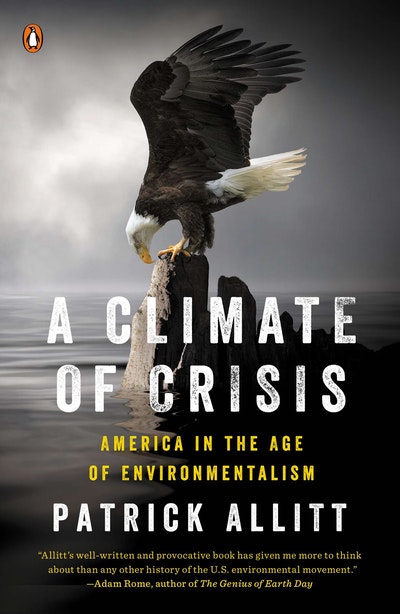- Published: 27 May 2015
- ISBN: 9780143127017
- Imprint: Penguin
- Format: Paperback
- Pages: 400
- RRP: $35.00
A Climate of Crisis
America in the Age of Environmentalism
- Published: 27 May 2015
- ISBN: 9780143127017
- Imprint: Penguin
- Format: Paperback
- Pages: 400
- RRP: $35.00
Wall Street Journal:
"In recounting partisan battles, Mr. Allitt's objectivity is refreshing...His critique of the relentless crisis mentality will lead many environmentalists to dismiss the book as anti-environmental, while anti-environmentalists will object to his conclusion that much conservation has been achieved at little cost to ordinary Americans."
Kirkus Reviews:
"A wide-ranging history of the American environmental movement. Allitt offers a readable account that will provoke and displease many environmentalists. . . .An optimistic book that downplays the clamorous work of environmental groups and attributes progress to the institutions of democracy and capitalism."
Booklist:
"Offering historical perspective on the tensions between industrialism, wealthbuilding, and environmentalism, Allitt traces social movements of the 1960s through the creation of Earth Day and the Environmental Protection Agency. Pondering the trade-offs of advancement and economic success vis-á-vis increasing polarization of industrialists and environmentalists, Allitt attempts to balance assumptions about who the good and bad guys are in the drama of the climate crisis."
Bookforum:
"At times unexpectedly entertaining"
Martin V. Melosi, author of The Sanitary City and Precious Commodity:
"In this sweeping study, Patrick Allitt covers every conceivable major character and event in the modern 'age of environmentalism.' The book is grounded in intellectual history, and seeks to find balance in interpreting the role of environmental advocates and naysayers, in successes and failures of governmental regulation, in objectives and outcomes. The tone is definitely optimistic about the long view of meeting environmental challenges in the United States. At the same time, in linking past to present, Allitt offers caution about what might unfold in the days to come. Above all else, he touts the value of history in assessing America's complex environmental legacy."
Adam Rome, author of The Genius of Earth Day:
"I don't agree with everything in A Climate of Crisis, but Patrick Allitt's well-written and provocative book has given me more to think about than any other history of the U.S. environmental movement. A Climate of Crisis is both bracing and exciting."



